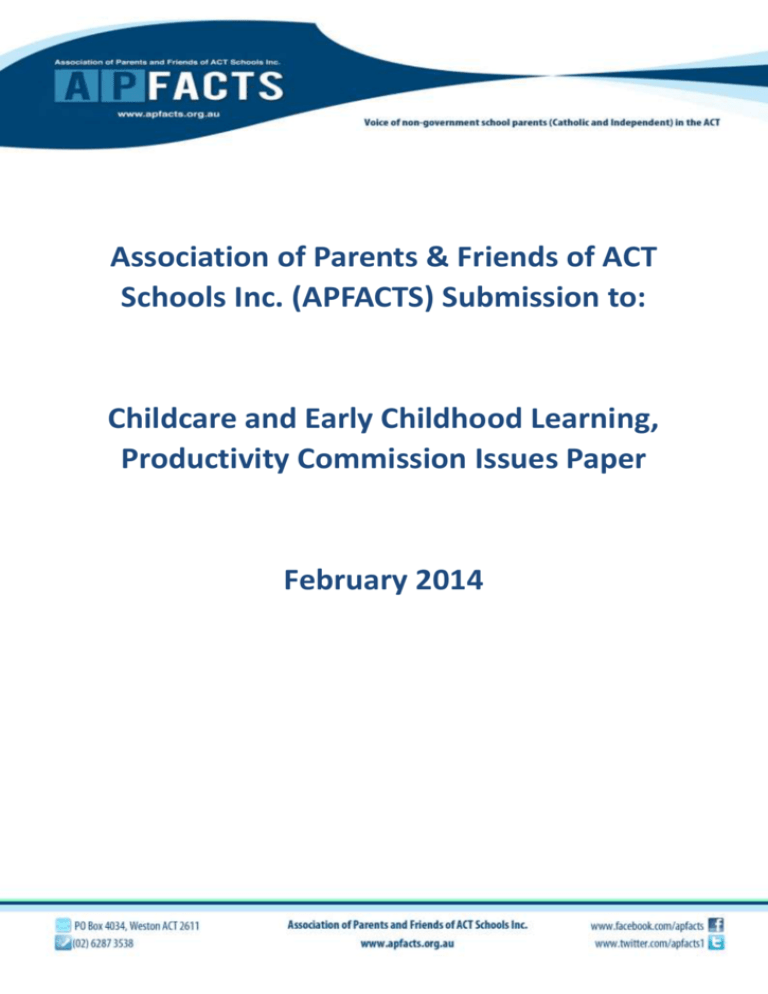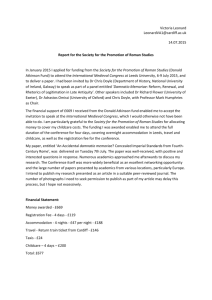Childcare and Early Childhood Learning
advertisement

Association of Parents & Friends of ACT Schools Inc. (APFACTS) Submission to: Childcare and Early Childhood Learning, Productivity Commission Issues Paper February 2014 INTRODUCTION The Association of Parents & Friends of ACT Schools (APFACTS) welcomes the opportunity to provide a submission to the Inquiry into Child Care and Early Childhood Learning. APFACTS is the peak body and advocates for parents and carers whose children attend nongovernment schools (Catholic and independent) in the ACT. APFACTS advances the interests of the broader non-government parent community through engagement with government, key stakeholder groups, as well as keeping its membership informed on latest and emerging education issues. As a non-denominational and a-political organisation, APFACTS aims to: - support parents and parent associations promote and facilitate parent school partnerships and parent engagement promote the interests of parents from non-government schools in all aspects of education promote the views of parents to education stakeholders, government and key stakeholders in the education arena advocate fairness, equity and improvement in education opportunities for all children in non-government schools respects and represent the right of parents to choose a non-government school education for their child without unreasonable financial disadvantage work to achieve equity in the distribution of public funds for education BACKGROUND The ACT educational landscape is unique in that educational attainment across all sectors and the capacity of all ACT parents to pay is high (ABS Cat no. 6302.0). The decision on choice of schooling for parents is therefore not about school systems, but about the best school setting to suit their child’s individual learning. This has resulted in 52 per cent of students in the ACT attending nongovernment schools which is 12% higher than the national average (ABS Cat no. 4221.0). This submission is made on behalf of the APFACTS parent community who are drawn from 52% of the ACT School parent population. In the Issues paper it was stated that almost all children in Australia attend some form of early education or care either prior to or during their primary years of schooling — be it centre-based care, family day care, school-located care, in-home care or mobile care. When accessible and affordable, quality care can contribute to children’s learning and development and make it easier for parents to work, train or study. The specific matters that the Commission has been asked to report and make recommendations on include: the contribution of childcare to workforce participation and child development current and future need for childcare in Australia, particularly given changes in work patterns, early learning needs, childcare affordability and government assistance the capacity of the childcare system to ensure a satisfactory transition to schools, in particular for vulnerable or at risk children alternative models of care, including those overseas, which could be considered for trial in Australia options - within existing funding parameters - for improving the accessibility, flexibility and affordability of childcare for families with diverse circumstances the impacts of regulatory changes, including the implementation of the National Quality Framework, on the childcare sector over the past decade. APFACTS submission will address each of the above mentioned points separately. APFACTS RESPONSE The contribution of childcare to workforce participation and child development The availability, accessibility and affordability of childcare have a direct impact on workforce participation for all parents in Australia. It is a situation that the government must take seriously if it wants to increase the participation of women in the workplace. Helen Conway, the Director of the federal government’s Workplace Gender Equality Agency believes that “the biggest driver to increasing the female workplace participation rate is affordable, accessible and flexible childcare.” (The Weekend Australian, February 15, page 19) APFACTS believes that it is not just access to childcare that the government needs to address to increase workforce participation but a range of issues such as: access to paid parental leave increase in flexibility in workplace hours and conditions flexibility in hours for child care to accommodate shift workers equitable funding for non-government early childhood education diversity of options for childcare such as in the home The demographics in Australia are changing with many families no longer living in close proximity to extended family members. Whilst many families are using grandparents to assist with childcare in the early years (0-4 years), there are equally as many families that are not able to draw on that resource and are relying on other forms of childcare to meet their childcare needs. (ABS 4211.0 Education and Training Newsletter, October 2012). Over the last decade, Australian and international research has established the importance of the early years in the development of a child’s brain. The experiences and quality of interactions in formative years provide the foundation for all subsequent learning and behaviour. Compelling evidence from the field of neuroscience suggests that “the first five years matter and last a lifetime” (Winter, 2010, p4.) Furthermore, research indicates that a loving, stable, secure and stimulating relationship with a caregiver in the early years of life is critical for all aspects of a child’s development and as more children spend a large proportion of their waking hours in a childcare environment the issue of a quality learning program that has stable, qualified personnel in childcare settings will be crucial for Australia going forward. Non-government schools in the ACT are introducing child care options in addition to early childhood programs in response to growing demand from our parent community. The majority of parents who are accessing the services of our member schools in the early childhood programs would be unable to work if they did not have access to these childcare options. For parents returning to work alongside their primary role as parents a greater flexibility needs to be determined and addressed. APFACTS believes that there are many issues that surround the decision making process for parents to return to the workforce, merely looking at workforce participation in isolation is to look at only half of the equation. Current and future need for childcare in Australia, particularly given changes in work patterns, early learning needs, childcare affordability and government assistance Current and future needs - APFACTS believes that the current needs of childcare in the ACT are not being met. It is our understanding that childcare centres have long waiting lists. In addition we have heard anecdotally that when women announce their pregnancies they are being asked if they have put their unborn babies on childcare waiting lists to ensure that they secure a place. Parents are discovering that they have to place their names on numerous waiting lists to ensure that they secure a place. As many parents forget to remove their names from other lists once they have secured a place it makes it difficult for centres to indicate when a place may be available. Consequently parents are left with very little notice to accurately plan on a date that they will be able to return to work. It is our belief that this situation is not limited to the ACT but is a national problem for Australia. Affordability (Childcare) - The average annual salary for the ACT is $88,504 (ABS Cat no. 6302.0.) which means that a large number of parents are able to claim the Childcare Rebate (CCR), capped at $7,500 per child, per year and are not eligible for any childcare benefit (CCB). There is another section of the community who do not qualify for childcare benefit and are earning less than the average salary but paying a large portion of one parents wage to access childcare. For these families it becomes a dilemma for parents as the cost of living in Canberra is high. When a family pays for childcare alongside the withdrawal of income support, non-illegibility for family tax benefit and increase in income tax the gain of increased hours in paid employment become disadvantageous. The cost vs benefit gap is decreasing, and the net benefit for primary carers to return to work or study is diminishing. This would indicate that for the average family in the ACT whilst affordability is a factor in the decision making process for childcare, the current issue in the ACT for parents becomes more about availability than affordability. APFACTS advocates for: a simpler Childcare benefit and rebate system; the removal of the many financial disincentives that are as result of the tax rates in place; shared responsibility for childcare funding and childcare funding linked to state and territory departments of education rather than Centrelink. Affordability (Pre-school) - Currently there exists a great inequity between government and non-government preschool environments. APFACTS believes parents have the right to choose an education program that bests suits the needs of their child and the particular needs of their family. Currently in the ACT parents have access to government funded preschool programs however, there is no government funding for preschool programs which are provided by non-government schools. APFACTS advocates for Preschool funding to be a basic universal right of all 4-5 year olds and fully funded despite sector or system in Australia, as well as equitable funding for nongovernment early childhood education. The capacity of the childcare system to ensure a satisfactory transition to schools, in particular for vulnerable or at risk children The significance of children making effective transitions from the early childhood service to the school has been highlighted by Dockett & Perry, (2001). They describe how important it is to have effective relationships between the family, community and the school as the basis for children making successful transitions and continuing to flourish both socially and emotionally. As previously mentioned a number of non-government schools in the ACT have early learning centres on their campus which allow children a smooth transition into kindergarten. The children are encouraged to spend time in the next class to ensure they are comfortable with the environment which gives them the security and support they need to flourish. In some of the non-government schools, childcare programs are also run on campus which then progress to the pre-school program and on to kindergarten. This is an ideal scenario for a child as they are comfortable in a familiar environment and have ample opportunity to be exposed to the next stage of their educational experience as they are included in whole school activities which ensures a seamless transition. The added benefit for parents with multiple children is that they are able to transport their children to one location which gives them additional time at home at the beginning and end of the day. Children with disabilities and additional needs are amongst the most vulnerable children in our community and are often not receiving the additional assistance they require. Inclusion in universal early learning programs is “just as important for young children with disabilities or developmental delays as for other children and the learning environments that children experience outside the home are just as important for their development as their home environments” (Moore, 2012, p. 19). Coordinators and staff often struggle with inclusion and have limited pre-service training in this area. Extra support does not exist for children who do not have a diagnosis and assistance of early intervention services are not connected to childcare settings. Furthermore, if children have been identified as needing assistance but do not meet all the criteria necessary, they are often ineligible for funding. In these cases, there needs to be alternative options for parents to access the required assistance. Governments need to prioritize skilling-up of the childcare workforce and explore opportunities for models of education and care that are currently successfully supporting disadvantaged families and children in other settings. The earlier that assistance is given for our vulnerable members of the community the better the outcomes will be. APFACTS believes that parents need to be afforded flexibility of one drop off and one pick up for multiple children at the school of their choice and advocates for less restrictive registration processes for non-government schools extending their services for childcare and preschools. Alternative models of care, including those overseas, which could be considered for trial in Australia There are a number of successful models in the OECD including in France where pre-school places are fully funded and the following model which is implemented in Denmark: In Denmark workforce participation by women is extremely high and the importance of the role of the family is recognised and respected. All young children in Denmark have the option of enrolment in a child care centre. There are a variety of child care options for children from 0-6 years of age. Each municipality determines its own overall goals and framework of child care options. Most child care programmes are located in institutions, but there are also municipal programmes whereby children are cared for in private homes, especially for children under three years of age. In addition, the municipalities provide subsidies to cover costs to parents who desire private child care instead of the public child care programmes. The price of child care is determined by the municipal board, but according to state law, parents must not be charged more than 25-28% of the cost of the child's care in the institution. (WorkinDenmark website accessed 19/2/14) APFACTS recommends that the Government explores these models further to evaluate the potential benefits for Australia. Options - within existing funding parameters - for improving the accessibility, flexibility and affordability of childcare for families with diverse circumstances Improving accessibility & Flexibility - A number of parents in Australia are not able to access child care centres due to the nature of their work, which requires them to work shift work including nurses and police. Alternative models of care need to be investigated which could include access to in-home care. It would be important to ensure that carers met the same regulations and requirements of all early childhood educators. Whilst APFACTS understands there is an in-home care program in place in the ACT there are limited places available and strict criteria for access to the program. Expansion of this program to allow access for shift workers would ultimately lead to greater workforce participation. The location of child care services also needs to be explored. Organisations which have child care centres on-site offer greater tax benefits to parents as they are able to salary sacrifice their childcare fees as an allowable fringe benefit. The additional benefits are that there is an increase in retention rates and productivity for employers who do offer an on-site service. There is also a greater participation of women in the workforce as they are more likely to return to their position after maternity leave. APFACTS advocates for the flexibility in hours for child care to accommodate shift workers. APFACTS believes that parents need to be afforded flexibility of one drop off and one pick up for multiple children at the school of their choice and advocates for less restrictive registration processes for non-government schools extending their services for childcare and preschools. Improving affordability - The Government must look at simplifying the Childcare benefit and rebate system in Australia by streamlining the system. In the same way that the education system in Australia requires shared responsibility of schooling, the same could be said for the childcare sector. Preschool or kindergarten funding is currently the responsibility of State and Territory departments of education around the country, while funding for childcare is still connected to our Commonwealth welfare system and paid to parents and carers via Centrelink. APFACTS believes that access to funding for all parents should be equitable regardless of the childcare choices they make or choice of school that they feel best meets the needs of their child. The impacts of regulatory changes, including the implementation of the National Quality Framework, on the childcare sector over the past decade. The National Quality Framework implementation has been a success at our member schools and as parents we welcome any improvements to the quality of care and education provided to our children. However, we understand that this has imposed a heavier burden on resources within the school environment. It is important that Commonwealth and State or Territory public funding be applied to alleviate this burden. As stated earlier in our submission the experiences and quality of interactions in formative years provide the foundation for all subsequent learning and behaviour in our children. It is therefore vital that the quality of our educators is maintained at the highest possible level. The more highly trained they are, the better they are able to initiate or lead programs and activities that engage and stimulate the children’s engagement and learning. Also, to the extent which it is practicable in the local circumstances, reducing the educator to child ratio enables closer attention to the needs of each child, increasing the prospects for better child engagement. APFACTS believes that it is important to have a Quality Framework that supports Parent engagement in the early years and beyond. In the ACT the establishment of a Preschool Matters Program which supports transition programs that develop partnerships between preschool, school and families is a great step forward and further options need to be explored in this area. Also, the national registers of educators, providers and services, set up under the Framework, greatly assist parents to evaluate childcare facilities and services nationwide. APFACTS applauds the recent establishment by the Commonwealth, the States and the Territories of the Australian Children’s Education and Care Quality Authority (‘ACEQA’) as a national regulatory body for childcare standards and programs, in particular as the overseer of the National Quality Framework. APFACTS urges all governments to maintain proper funding and resourcing to ACEQA to enable it fully to fulfil the mandate given it upon establishment. Any diminution of resources or funding to ACEQA, or childcare programs and services more generally, whether in response to supposed budgetary constraints or otherwise, will only be counterproductive to that objective of childcare of increasing workforce participation by parents. In leaner times, increased workforce participation by parents can only help drive economic growth. APFACTS believes the early years framework is very good, the importance of having the right carer/child ratio that facilitate a ‘bond’ between carer and child alongside quality framework ensures we are giving our children the best start. APFACTS advocates : · The endorsement of the early years framework for childcare · Sufficient carer/child ratio in childcare centres · Quality of learning environment to be a focus of the review · Parental engagement stratagies embedded in the Early years framework be retained. The early years framework also has a heavy emphasis on the involvement of parents. This level and mechanisms for parental engagement will hopefully set a good foundation for both the children and parents for the rest of schooling. REFERENCES Australian Children’s Education and Care Quality Authority (ACEQA) website accessed 20.2.14 ABS Cat no. 6302.0. May 2013 (ACT Full-Time Adult Average Weekly Ordinary Time Earnings at $1,702.00) ABS Cat no. 4221.0. page 12, Table 1 (Student enrolment numbers by Affiliation, 2002–2012) ABS 4211.0 - Education and Training Newsletter, October 2012 Dockett, S., & Perry, B. (2001). Starting School: Effective Transitions. Early Childhood Research and Practice, Vol 3 No 2 Moore, 2012, p. 19 The Weekend Australian, February 15, page 19 Winter, 2010, p4. WorkinDenmark website accessed 19.2.14






